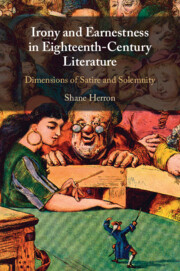Book contents
- Irony and Earnestness in Eighteenth-Century Literature
- Irony and Earnestness in Eighteenth-Century Literature
- Copyright page
- Dedication
- Contents
- Acknowledgments
- Abbreviations
- Introduction On Ludicrous Solemnity
- Chapter 1 Swift and the Hacks
- Chapter 2 “By One of the Fair Sex”
- Chapter 3 Keeping Up Appearances
- Chapter 4 Dark Humor and Moral Sense Theory
- Chapter 5 Gratitude for the Ordinary
- Epilogue Earnest Satire, Cynical Credulity, and the Task of Irony
- Notes
- Bibliography
- Index
Chapter 2 - “By One of the Fair Sex”
Irony, Sovereignty, and Sexual Difference
Published online by Cambridge University Press: 19 January 2022
- Irony and Earnestness in Eighteenth-Century Literature
- Irony and Earnestness in Eighteenth-Century Literature
- Copyright page
- Dedication
- Contents
- Acknowledgments
- Abbreviations
- Introduction On Ludicrous Solemnity
- Chapter 1 Swift and the Hacks
- Chapter 2 “By One of the Fair Sex”
- Chapter 3 Keeping Up Appearances
- Chapter 4 Dark Humor and Moral Sense Theory
- Chapter 5 Gratitude for the Ordinary
- Epilogue Earnest Satire, Cynical Credulity, and the Task of Irony
- Notes
- Bibliography
- Index
Summary
Chapter 2 explores how Behn’s works use earnest commitments to heighten and refine her more traditional satirical attacks on political enemies, resulting in complex and multilayered subversive ironies: it is often Behn’s insistence on affirming certain political commitments that endows her work with its acerbic bite. Her supposedly conservative fictions antedate, rather than satirically reacting against, the later more progressive, Whiggish novels, and her works thereby demonstrate the complex symbiotic relationship between irony and earnestness. In her work, satiric attack functions not simply as a way of denigrating enemies, but also as a means of inoculating and immunizing creative energy against possible attack. Her satire on the Whigs also has an earnest dimension, implicitly praising a new model for sovereignty that identifies it closely with women’s vulnerable positions in a patriarchal world. This earnest deployment of satire emerges as Behn engages the problem of actresses and women in the theater more generally to emphasize her subtle differences with some of her male peers and to reimagine Tory politics from their perspective.
- Type
- Chapter
- Information
- Irony and Earnestness in Eighteenth-Century LiteratureDimensions of Satire and Solemnity, pp. 54 - 84Publisher: Cambridge University PressPrint publication year: 2022

